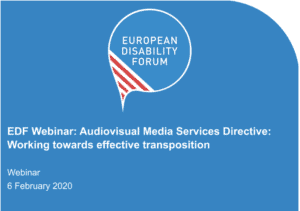Political groups, the Social Democrats (S&D) and the European People’s Party (EPP), have taken concrete steps in support of EUD’s Petition no.1056/2016 by drafting and submitting two amendments for an EU Parliament Budget report. This petition, submitted in 2016, calls for the possibility for deaf EU citizens to table petitions in their national sign languages. Currently, the lack of possibility to table petitions in national sign languages of the EU, contradicts Articles 9 and 21 of the CRPD, of which the EU is a State Party.
We have been working hard to progress this petition for the past few months given the lack of progress on it for the past 8 years. Specifically, we have made two statements (November 2023 and March 2024) in the EU Parliament’s Petitions (PETI) Committee and worked with key MEPs to further progress this long overdue petition to become a reality. This would signify a step towards deaf people’s full and equal enjoyment of their right to political participation in the EU.
Thankfully, as a result, there has been a growing support from the EU Parliament on our position. The most recent development – last week on 11th April 2024, during a plenary session, the EU Parliament adopted the two previously mentioned amendments, in support of our petition, to the Committee on Budget Control (CONT) Report on the discharge (final approval) of the the EU Parliament 2022 Budget. Although this is a non-binding recommendation, it is still very influential and promising for officially implementing the option to table petitions in national sign languages of the EU in the coming legislature. This marks a pivotal moment as the European Parliament has unequivocally endorsed our longstanding request and, as a result, should feel compelled to take action on it.
Next steps?
When the new legislature begins, we will continue to advocate for our petition to finally become a reality. The adoption of these two amendments is a first step in the right direction. Next, we will work with the Constitutional Affairs (AFCO) Committee in order to amend the Rules of Procedure (no. 226 (6)) which state that petitions can only be submitted in written form.
S&D amendment:
Recalls the deaf community’s
long-standing demand, since 2016, for the
ability to submit petitions to Parliament in
EU national sign languages; stresses that
the measure would allow the deaf
community to express their right to
petition, which is one of the fundamental
rights of all European citizens, enshrined
both in the Treaty and in the Charter of
Fundamental Rights; notes the analysis
carried on by DG LINC and DG ITEC on
the most efficient solution with minimal
cost sent to the Committee of Petitions in
May 2020; calls on the administration to
adopt this solution and to facilitate the
submission of petitions expressed in EU
national sign languages via the Petitions
Portal;
EPP amendment:
Recalls the deaf community’s
longstanding demand for the possibility to
submit petitions in national sign
languages used within the Union; notes
the discussions held during the Committee
of Petitions meeting on 29/11/2023 and
19/03/2024, specifically addressing
Petition 1056/2016, and underlines
Parliament’s commitment to enhancing
accessibility for all European citizens;
recalls that the European Parliament’s
Rules of Procedure require petitions to be
submitted in written form; calls on
Parliament’s Administration to implement
the necessary changes in the Petitions
Portal in order to enable Petitioners to
support their written petition with a video
recorded translation in sign language;
encourages the Administration to invite
relevant stakeholders, including
representatives from the deaf community,
to provide input and feedback during the
implementation process to ensure the
effectiveness and inclusivity of the
proposed measures;













